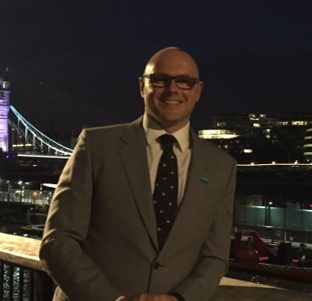
Sean Kelly served in the Royal Corps of Signals, promoted to the rank of WO2, leaving in 2022 after a 24-year service. Sean spent most of his career as a “Communications Information Services Engineer. I began specialising in satellite communications and latterly electronic counter measures. After achieving the rank of Staff Sergeant, I had several varied roles which saw me move away from communications engineering and focus more on Regimental Duty type roles, for example, Squadron Quartermaster Sergeant and Squadron Sergeant Major. My final role in the military was as a Unit Welfare Warrant Officer, there was no “typical” day, you could never predict who was going to come through the door and what sort of issues they would present. It would be routine to deal with SP and dependants with financial worries, gambling issues, housing and accommodation issues, family related problems, frictions in the CofC and the general added complexities of Service life. The role required the utilisation of a number of soft skills built up over the course of a 24-year career. It also required a good deal of emotional intelligence and the ability to listen, understand and signpost people in the right direction. I was bound by a strict code of confidentiality, although output in this role was not as high as others I had undertaken in the military, it was certainly the most emotionally challenging role that I had.”
On leaving the armed forces, Sean secured a role as an Assistant Project Manager with Mace (Consult). “I received a text message from a Mace employee. The text was asking if I could spare ten minutes for a chat as they’d like to put me forward to the military CV review board the following day. I was a little dubious but curious, we had a chat that night and it transpired that Mace review Veterans’ and Service Leavers’ CVs for any good fits with their organisation. After the CV review board, I was informed that the team from Mace’s Health and Education department wanted to offer me an interview. This was set up a few days later and I was subsequently offered the job.”
Sean advised: “I do not feel that there is much that could have prepared me for my own internal thoughts and feelings that I was experiencing prior to leaving the Military. Although I had prepared myself and several people reassured me that I was highly employable, the thoughts of impending unemployment and lots of self-doubt creep in. The questions, ‘have I done the right things?’ and ‘could I have done more?’ inevitably come to mind. I do feel that getting on board with BuildForce was a move in the right direction. Engagement from BuildForce was always positive and each step was a step in the right direction. I was offered mentors in the construction industry, the chance to attend construction employment fairs and even work experience with a major construction employer.”
Sean would advise other service leavers, “You have lots of transferrable skills, do not get too disheartened by knock backs. Take all of the advice you can and attend every event you are able. Have a good generic CV that can be tailored to specific job roles, do not use the same CV for every role you apply for. Really read job descriptions and ensure that you mirror the language that is used when tailoring your CV. Do not undersell yourself – know your value.”
In Sean’s current role “I have been given a project to lead at Birmingham’s Queen Elizabeth Hospital. The project is to replace a scanner and the overall budget is approx. £3m. My role entails ensuring the project remains on track in terms of time, cost, and quality. Coupled with this, the communication of potential risks and issues to the right people at the right time, in order for informed decisions to be made. I would usually chair a meeting with all stakeholders on the project. The discussion would revolve around progress and risks and issues. This is a key time for stakeholders to raise RFIs, issue tasks and problem solve. Off the back of the meeting, I would then prepare minutes, update the action and RFI trackers, the issues register and action any points that I may have to deal with. I think the biggest skills in my current role are my ability to communicate, to manage relationships, assess situations to make quick, informed decisions have been honed by years of experience in the military. Having a good deal of emotional intelligence really helps in the management of relationships.”
Three words Sean would use to describe a career in construction “Challenging. Rewarding. Sustainable.”